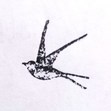Ad Luna #9: The Essay, Part 7 – Conclusion
So this is the original end of the dissertation – there were plenty of other things I wanted to write about, but I just couldn’t fit them in! I did actually write one of those chapters out in the first draft, so I may post that as some bonus content (never before seen by examiners!). But for now, I’ll just sum the whole thing up.
7 – Conclusion
“It’s been a long road, / Getting from there to here…”
On the surface, Star Trek’s vision of the future is so far removed from Lucian’s cosmic voyage that it seems impossible to find any similarity between the two texts. Yet similarities there are, in the ways in which both the True History and Trek present social themes to their audiences through cognitive estrangement. There are many similarities in what both Roman and modern audiences experienced, feared, and expected of the strange new worlds that their SF presents. The fear of losing one’s individuality, of unstoppable, destructive change, is embodied in Trek by the Borg, and in Lucian by the Vine-Women. In Trek the fear is ideological, of the insidiousness of Communism; in Lucian the fear is physical, historical, the fear of the devastation of plague. Similar, too, are Roman and modern approaches to gender and their objectification of women. The TH illustrates Rome’s male-dominated society, presenting women as objects of desire at best and insidious seductresses at worst, and Trek, despite its professed progressiveness, did the same in various episodes, showing not how far humanity has come but also how far it still has to go.
Many social issues in Rome, as depicted in the TH, are still faced by us today – but on some of those issues it seems the Romans may in fact have been more progressive than we are. Trek’s track record on homosexuality has been poor, reflecting the conservative values of the 20th century in unfortunate clarity. By contrast, Lucian’s presentation of the entirely homosexual Selenite society mirrors a remarkably tolerant Roman society by modern standards. SF shows not only our leaps forward, but our steps backwards. The most striking difference between Lucian and Trek’s reflections of their respective worlds, however, is the difference between attitudes to the ‘other’. In Lucian’s world there were two tiers to all culture; the civilised – the Greek and Roman – and the barbarian. The Romans and the Selenites are on one level, united by language and culture – but the animalistic Aquatics and Bullheads, less socially advanced, are to be civilised by their Roman betters. The TH echoes the real imperial expansion ongoing through Lucian’s lifetime and the history of Rome; the aggressive uplifting of the world, by Rome, to its own cultural standards. Trek showcases a future where humanity has moved beyond such behaviour, promoting the anti-imperialist philosophy of the Prime Directive, preventing any interference regardless of intent – despite the imperialist abuses being committed by the society of its audience as it aired and to this day. The values of Lucian’s Rome and Trek’s 20th-century West were at once very different and strikingly similar.
ST holds up a mirror to a society very different to Lucian’s Rome – but both Trek and the TH mirror their societies in the same way. Effective SF “relates symbolically back to key concerns of the society and culture out of which it was produced”; this is as true of Lucian as it is of Trek. Through his encounters with the alien, his exploration of strange new worlds and societies, Lucian presents real issues to his audience through the distorting lens of science-fiction; attitudes to the other, to sexuality, to the fear of contagion and much more besides. This is precisely what Trek has done for Western society since the 1960s, reflecting on wars hot and Cold, on sexuality, slavery, racism and identity. The TH, in my view, does just the same. Was this Lucian’s intention? Can we be sure that he meant for his audience to consider the issues of their own society through his parodic reflections and cognitive estrangement in the TH, just as Trek does for modern society? I believe he may well have done, and hope that I have gone some way to proving that possibility in this dissertation. Whatever his own opinions might have been on Roman society, Lucian, in the TH, presents that society to his audience and uses cognitive estrangement to help them imagine other societies, other worlds; perhaps better ones, perhaps worse; perhaps with the intention of changing their views – or perhaps not. That, in my view, is the essence of good science-fiction, and it is an essence shared by Trek. Even when one boldly goes where no-one has gone before, even the strangest of new worlds is ultimately a reflection of our own.
“We are all explorers, driven to know what’s over the horizon, what’s beyond our own shores. And yet the more I’ve experienced, the more I’ve learned that no matter how far we travel, or how fast we get there, the most profound discoveries are not necessarily beyond that next star. They’re within us, woven into the threads that bind us, all of us, to each other.”
Captain Jonathan Archer, 2155
Every Star Trek captain is just such an explorer. Their adventures let us, the audience, explore our own societies, our own prejudices, our own selves. Jean-Lucian, in the True History, was driven by the same urge, and his adventures provided his audience with the same opportunities for explorations of their own. They still do. The Final Frontier began in the Second Sophistic, and Lucian was the first to visit it.
Diane Warren, Where My Heart Will Take Me (Decca, 2001) – the theme music of Enterprise.
Roberts, New Critical Idiom, p.48-9
ENT 4.21, Terra Prime, dir. Marvin V. Rush (13/5/2005), 0:37:00 – 0:38:33



